1110 Search Results for Core
October 22, 2013
by Carole Zangari -
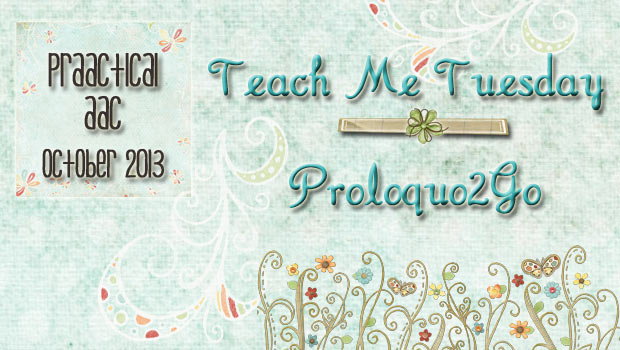
This week in Teach Me Tuesday we’re learning more about Proloquo2Go (P2G) by AssistiveWare. Here are the learning resources we’ll be using. Getting Started Webinars (on the right) Overview/Intro to P2G 3 Core Word Vocabulary-How to Customize It and Basic Communication Vocabulary: How to Customize It P2G Options, Part 1 and Part 2 Buttons, Clues, & Resources Making Back Ups and Saving: Save, Transfer & Restore a Backup Using iTunes for Windows Save, Transfer & Restore a Backup Using iTunes for Mac OS X Save, Transfer & Restore a Backup Using Dropbox Save, Transfer & Restore a Backup Using Using WiFi Getting Help within the P2G App Beyond the Basics Advanced Customization VocaPriority: Prioritize Vocabulary by How Frequently It Gets Used For those who Used the Original P2G Upgrading to P2G 2 Moving from the Old Vocabulary to the New Ones Discussion board/forum by AssistiveWare Manuals and documents by AssistiveWare Connect with AssistiveWare... [Read More...]
October 19, 2013
by Carole Zangari -
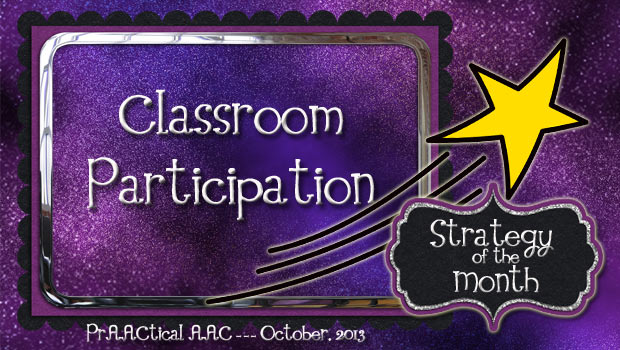
How can SLPs support students who use AAC and help them communicate more frequently in the classroom? Collaboration with the teacher is, of course, central to making this work. If you’re paired with an educator who knows, loves, and supports the AAC needs of her students, then you are in for a real treat. Collaborating with someone like that is fun and energizing. But what if your partner is new to AAC or one who doesn’t really know (or care to know) much about it? What if there is a bit of resistance to change or a passive-aggressive style? No match for a committed clinician! Ah. The ART of being an SLP. Take equal measures of creative problem-solving, wonderful pragmatics, and tenacity, and solutions will be found. In really sticky situations, we’ve seen colleagues make breakthroughs on the strength of brownies and iced coffee. You know how to make this... [Read More...]
October 7, 2013
by Robin Parker -
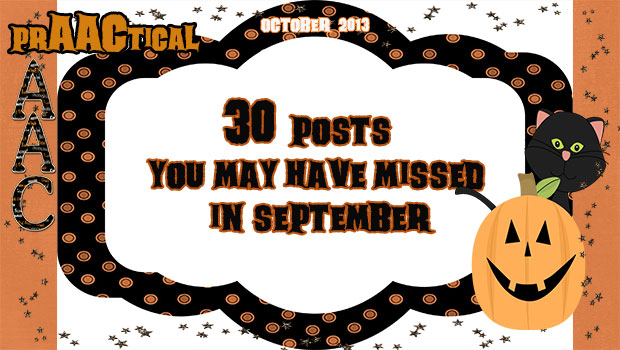
Strategy of the Month Infusing Literacy Learning Opportunities into AAC Therapies AAC & Literacy: Setting the Stage Literacy Lessons for Beginning AAC Learners Literacy for Everyone with Adapted Books PrAACtical Thinking PrAACtical Resources: A Look at the NJC The PrAACtical Power of Contrast 31 Posts You May Have Missed in August Literacy: Cookies & Core 5 Things to Love About the SETT Framework 10 Tips to Encourage Love of Literacy 5 Easy Ways to Add Authentic Writing Experiences to Your AAC Therapy AAC & Dinosaur Apps for Literacy & Language 5 AAC Strategies and the Use It of Loose It Philosophy 10 AAC Intervention Apps We Can’t Live Without 5 Things to Consider About Prompts in Teaching AAC Loving Literacy in AAC Keep Calm & Write ON.. fro All Writers Thoughts on Involving Our Clients in AAC Vocabulary Selection Presuming Competence & Teaching AAC 5 reasons We Don’t (Typically) Use... [Read More...]
October 5, 2013
by Carole Zangari -
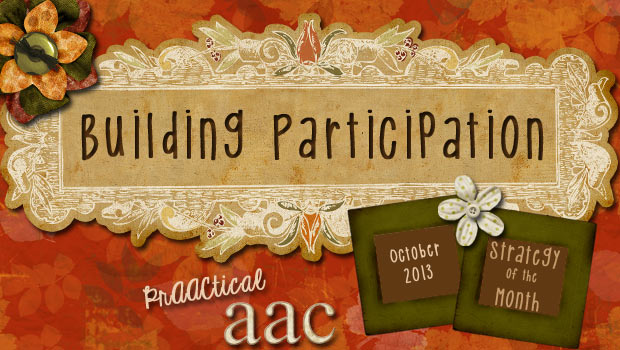
Do you know any of our friends? Jenna can use a talking switch with only a little bit of support. But at calendar time, no one thinks of asking her a question. Hao knows almost two dozen signs and can use a communication wallet with non-signers. But at social gatherings, he’s mostly off to the side playing a game on his iPhone. Isaac uses his SGD capably and can create grammatically correct sentences that include noun phrases and conjunctions. But in Chemistry, his lab group conducts their experiments and writes up the lab report without his contributions. Sienna is able to choose between preferred and non-preferred items in a field of three and is learning to do so in a field of four. But the only time she gets to make a choice is at mealtimes. Like many of you, we put in countless hours helping children and adults who... [Read More...]
October 4, 2013
by Robin Parker -
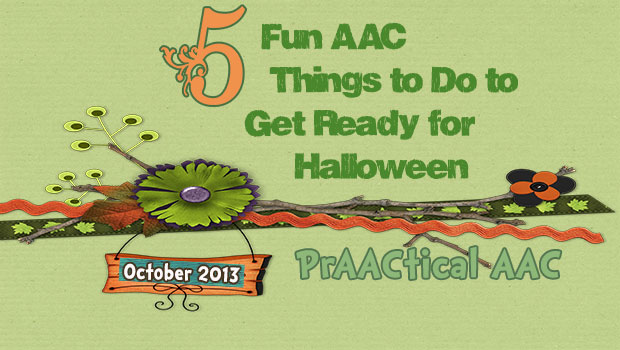
We love to start planning for holidays early. It helps facilitate conversation before, during, & after exciting activities and events. When we begin using core and fringe vocabulary early, frequently, and authentically the learner has the most opportunity for success. Use Schedules: Use a monthly calendar to have a Halloween countdown, Use mini-schedules to make food recipes, spooky science concoctions, or even to plan the trick or treating routes. Use a small talk app like Fat Cat Spooky Chat to prAACtice what you will SAY (October core words) on Halloween. Use a social narrative to prepare everyone for what to expect on and around Halloween. More Halloween social narratives can be found at Autism Community, One Place for Special Needs, Katherine Sanger You Tube, & Kentucky Autism Training Center Prepare a choice board of Halloween costume options and let the learner decide on the costume. PrAACtice a script to be... [Read More...]
September 30, 2013
by Robin Parker -
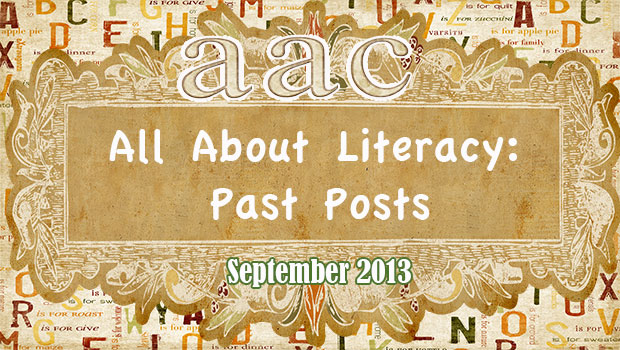
We say goodbye to International Literacy Month. It’s time to move on…. to International AAC Month (exciting things to come 😉 ). But, just in case you missed any of our past posts about literacy, here they are all together. Reasons to Discover & Love MeeGenius 5 Ways to Help People with AAC Needs Develop Inner Speech 5+ Sites for Free AAC Friendly Literacy Resources Making Decisions About Reading Accessibility Options Loving Literacy Resources Making Libraries Inclusive 5 Things We Love for Supporting Literacy Learning by People Who Use AAC 5 Ways to Make Page Fluffers & Spacers 14 Valentines Day Activities:m Love, Literacy, & Learning The Joy of Reading: World Book Day 5 More Resources and Ideas for World Book Day Literacy, AT,, & Students with Significant Disabilities PrAACtically Ready to Read 7 Apps and Activities for ALL Writers Literacy For All: A Video Series by Dr. Caroline Musselwhite... [Read More...]
September 21, 2013
by Carole Zangari -
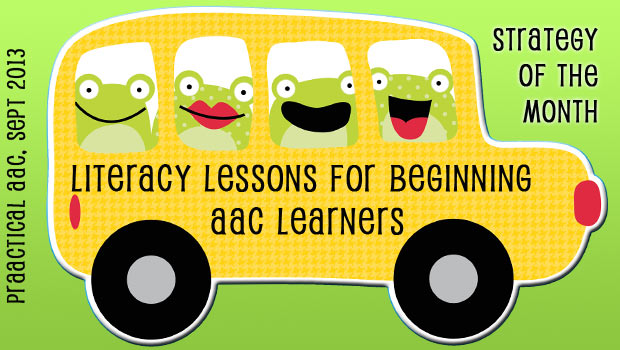
Like some of you, we are often met with skepticism when we encourage teams to work on literacy skills with individuals who are still learning the very basics of communication. Recently, we had the opportunity to begin this journey anew, and model a literacy lesson for kindergartners who have no formal communication system, are not answering yes/no questions, and do not consistently select preferred items when offered choices. Why work on literacy with students who are not routinely expressing their basic preferences? Because the longer we wait, the longer it will take to get there. Because it offers wonderful opportunities to build communication, too. Because when other people see us teaching reading and writing, it changes their perception of the student in a positive way. Because they will enjoy it. Because there are mandates for us to address the general education curriculum. Because if we set the bar high and... [Read More...]
September 14, 2013
by Robin Parker -
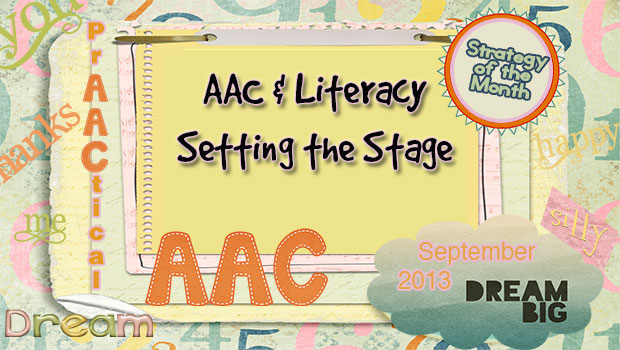
Literacy is for all students. As with most things we learn, emergent readers and writers need to be active participants with print across multiple settings and in multiple meaningful experiences. Emergent readers need to be taught to integrate reading and writing with communication and language. To facilitate this comprehensive integration and understanding, SLP’s and educators can use a variety of authentic research based strategies to help. Create a literacy enriched environment- Literacy skills are promoted through an environment with lots of reading and writing materials. Text based labels and signs will help bring meaning to text in authentic experiences. As you plan activities, include options for writing time/centers, and reading time/centers. Have books accessible to learners. Have lots of book options, but also help students independently turn pages (make it easy with page fluffers), reach books, use writing materials, etc. During interactive activities, give learners a choice of 2 or more books to... [Read More...]
September 12, 2013
by Robin Parker -
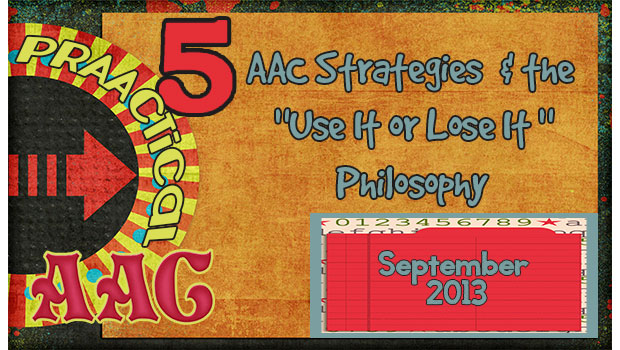
School has begun for almost everyone. Some classes have been in session for a while and routines have been formed, learning is taking place, behaviors have settled down. Now comes what can seem like the hard part: Keeping up with and expanding the strategies that helped students become successful. Instead of trying to fade AAC displays/devices and visual supports, stick with the basics and expand how they can be used. Because if you don’t use it, you may lose it. So: Keep up with: Visual Schedules– monthly, daily, and mini. Even if students know the schedule, continue to use it. Most of us would not like ‘losing’ our day planner or ‘to do’ lists even though we know our schedules. Aided Language Input First- Then Visual Support Visual Boundaries Access to a AAC Display/Device– And the display or device is with the student All the time, everywhere, charged, working, and... [Read More...]
September 11, 2013
by Robin Parker -
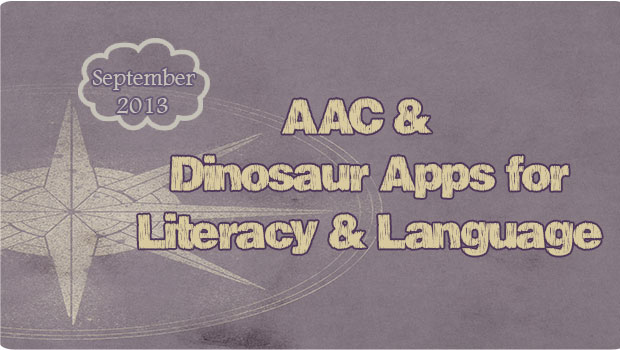
We have students of all ages who love dinosaurs. From young children to the teenager or adult we can use the theme of dinosaurs when teaching AAC, language and literacy. You can do a theme of fun dinosaurs all the way to paleontology and archeology. Dinosaurs as a theme can support goals for core & fringe vocabulary, narratives, reading, and writing. Many students will do more and work harder if there is a high interest theme. Here are some apps for those dinosaur loving students. Dinosaurs Books BooksHow to Hide A Dinosaur– children, iPad, fun book Dinoboy Adventures– children, iPad & iPhone +, interactive book where you can make choices to modify the story Tiny Time Machine- Dinosaurs– children, iPad & iPhone +, a travel adventure mystery Oh Can You Say Di -NO -Saur Dr. Seuss Cat In the Hat– children, iPad & iphone + , fun book Dinosaur Book HD: iDinobook–... [Read More...]









